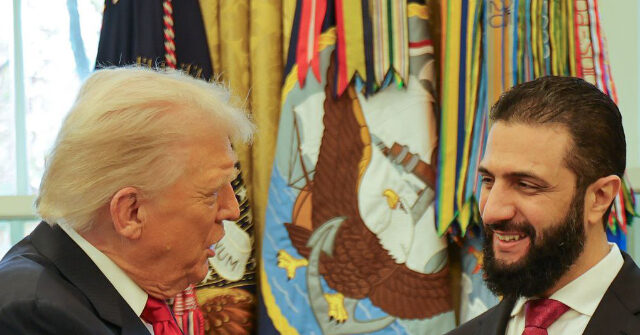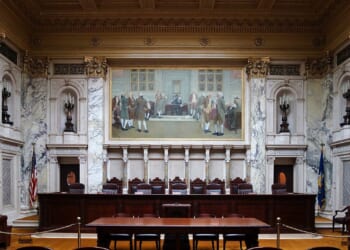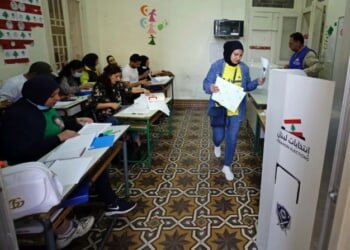Syrian President Ahmed al-Sharaa met with President Donald Trump at the White House today, becoming the first Syrian leader to visit the White House since Syria became independent from French colonial rule in 1946.
Sharaa quietly entered the White House through a side entrance on Monday and remained inside for about an hour and a half. He was greeted by a crowd of several hundred supporters upon his departure, many of them waving Syrian flags. Neither the White House nor Sharaa’s office issued an immediate public statement about the meeting, nor have any details surfaced at press time.
The stakes for the visit were high, as the former al-Qaeda officer and wanted terrorist Sharaa sought to convince the Western world he can complete the transition to a peaceful, inclusive, and trustworthy democracy.
House Foreign Affairs Committee Chairman Brian Mast (R-FL) set the stage for the Trump-Sharaa meeting with an optimistic statement about his own meeting with the Syrian leader on Sunday night.
“Last evening, the new Syrian President Ahmed al-Sharaa and I broke bread. We had a long and serious conversation about how to build a future for the people of Syria free of war, ISIS, and extremism,” Mast said on Monday morning.
“He and I are two former soldiers and two former enemies. I asked him directly, ‘Why we are no longer enemies?[sic]’” Mast said. “His response was that he wishes to ‘liberate from the past and have a noble pursuit for his people and his country and to be a great ally to the United States of America.’”
Mast is a decorated U.S. Army veteran who lost both of his legs while serving as a bomb disposal expert in Afghanistan during the War on Terror. Sharaa is a former al-Qaeda operative who was captured while fighting against U.S. forces in Iraq.
Mast was confident that Sharaa would “officially join the Global Coalition to Defeat ISIS” after meeting with Trump – a major step in Sharaa’s rehabilitation from jihadi to statesman, given that Sharaa worked under ISIS founder Abu Bakr al-Baghdadi in their al-Qaeda days, and was invited to join the Islamic State when Baghdadi established the organization.
Rep. Joe Wilson (R-SC), who also met with Sharaa on Sunday, likewise gave Syria’s interim president a vote of confidence by calling on Congress to permanently lift sanctions.
“A free, united, prosperous Syria is the biggest opportunity since the end of the Cold War. We must give Syria a chance and achieve a COMPLETE and TOTAL repeal of Caesar,” Wilson wrote on X.
The Caesar Civilian Protection Act of 2019 imposed heavy sanctions against the regime of dictator Bashar Assad for violating the human rights of his citizens. Assad was overthrown in December 2024 by a coalition of insurgent and jihadi groups led by Sharaa. President Trump lifted and suspended as many sanctions as possible by executive order in July.
Rep. Mast has been one of the congressional representatives opposed to lifting the Caesar Act, partly at the urging of the Israeli government, which intervened to protect the Druze minority from attacks by Bedouin Muslims and security forces from Sharaa’s government in July.
The Treasury Department announced on Monday that it has suspended implementation of all Caesar Act sanctions for 180 days, with the exception of “certain transactions involving the governments of Russia and Iran.”
The Treasury Department said lifting the sanctions would fulfill President Trump’s promise to give Syria “a chance at greatness.”
“The US government has adopted new policies and regulatory posture to encourage US businesses and banks, the international community, the Syrian people, and regional partners to contribute to Syria’s stability while denying resources to harmful actors,” the statement said.
The waiver from Treasury was not the complete and permanent lifting of sanctions that Sharaa wanted, and which only Congress can deliver. The new Syrian government fears that international investors will be reluctant to take big risks on reconstruction as long as the Caesar Act sanctions have only been waived temporarily.

















